skip to main |
skip to sidebar
 Photo: © 1978 Lois Siegel, used by permission; text adapted from Wikipedia.
Photo: © 1978 Lois Siegel, used by permission; text adapted from Wikipedia.
The Canadian avant-garde director of short experimental films Arthur Lipsett was born on 13 May 1936. His particular passion was sound: he would collect pieces of sound and fit them together to create interesting auditory sensations, and friends suggested that Lipsett put images to them. The result became the seven minute-long 1961 film Very Nice, Very Nice which was nominated for an Academy Award in 1962. Despite not winning the Oscar the film brought Lipsett considerable praise from critics and directors. Stanley Kubrick was one of Lipsett’s fans and asked him to create a trailer for his upcoming movie Dr. Strangelove; Lipsett declined Kubrick’s offer, however Lipsett’s influence on Kubrick is clearly visible when watching the trailer.
Lipsett’s later film 21-87 was a profound influence on director George Lucas who included elements from it in THX-1138, his Star Wars films and also American Graffiti; 21-87 is also said to be the source of the “The Force” in Star Wars. Lucas never met Lipsett but tributes to 21-87 appear throughout Star Wars, for example the holding cell of Princess Leia in Episode IV: A New Hope on the Death Star is cell no. 2187.
Lipsett’s success allowed him some freedom, but as his films became more bizarre this freedom quickly disappeared and he suffered from psychological problems. Lipsett committed suicide in 1986, two weeks shy of his 50th birthday.
 Photo: © 2007 Somtow Sucharitkul, used by permission.
Photo: © 2007 Somtow Sucharitkul, used by permission.
Somtow Sucharitkul – better known to SF fans as S.P. Somtow – was born in Bangkok, Thailand, on 30 December 1952. As active in science fiction and horror as he is in composing and conducting classical music in Thailand, he has been described by the Bangkok Post as the “Thai person known by name to the most people in the world.” He was first published in the 1970s in Asimov’s Science Fiction and has since been nominated for many major awards, including the Bram Stoker Award, the John W. Campbell Award, the Hugo Award, and is also winner of the World Fantasy Award. He now holds the post of president of the Horror Writers Association and is currently artistic director of the Bangkok Opera.
 Photo: AlfredTNT, 2006. (GFDL); text by Doris Lessing (fair use)
Photo: AlfredTNT, 2006. (GFDL); text by Doris Lessing (fair use)
“A visiting American said, did I read science fiction? I offered Olaf Stapledon, H. G. Wells, Jules Verne, and he said it was a good beginning. Then he gave me an armful of science fiction novels. What I felt then I have felt ever since. I was excited by their scope, the wideness of their horizons, the ideas, and the possibilities for social criticism ... and disappointed by the level of characterization and the lack of subtlety. ... But if what we do get is so wonderfully inventive and astonishing and mind-boggling, then why repine? In science fiction are some of the best stories of our time.” —Walking in the Shade, 1997.
Born on 22 October 1919 in Kermanshah, Persia (now Iran), Doris Lessing has won all the major European literary awards. Her first words on hearing that she had also won the 2007 Nobel Prize in Literature were, “Oh, crap.”
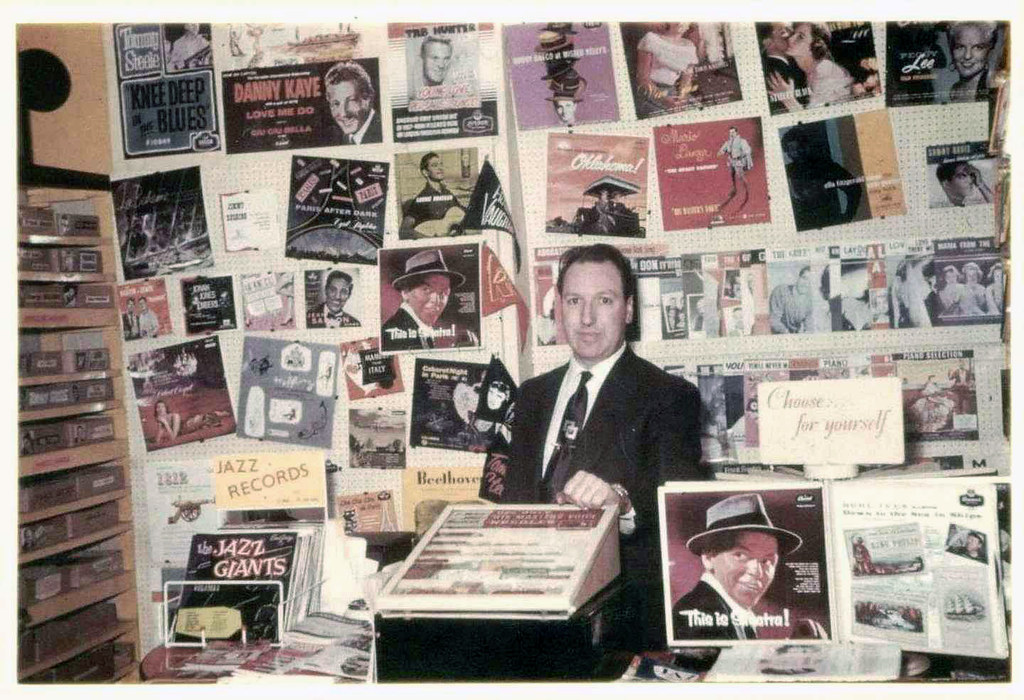 Photo: Les Flood; text by Peter Weston.
Photo: Les Flood; text by Peter Weston.
During the 1950s and early ’60s Leslie Flood’s ‘Fantasy Centre’ bookshop at Sicilian Arcade, near Kings Cross, London, was the absolute mecca for SF enthusiasts. He had a huge stock of new and secondhand books and magazines, including scarce US titles - desperately sought-after, in those days when currency controls prevented imports from America. Many treasures were to be found in that basement, but science fiction alone couldn’t support a shop in such a central location, so the ground floor was given over to music and records - not such a bad idea in 1956, when this picture was taken, when jazz and science fiction were contemporary bedfellows.
Les Flood was a regular at the ‘White Horse’ pub meetings and conventions, and was also one of the ‘Gang of Four’ (along with John Wyndham) who launched the International Fantasy Awards in 1951. He was involved with the establishment of the London-based SF Luncheon Club in 1954, and in 1957 presented the final IFA to a bemused J.R.R. Tolkien for Lord of the Rings. Les was closely associated with Ted Carnell’s New Worlds as a reviewer and supporter, and eventually took over the Carnell literary agency when Ted retired. Les died in August 2007 in Spain, where he had lived for many years.
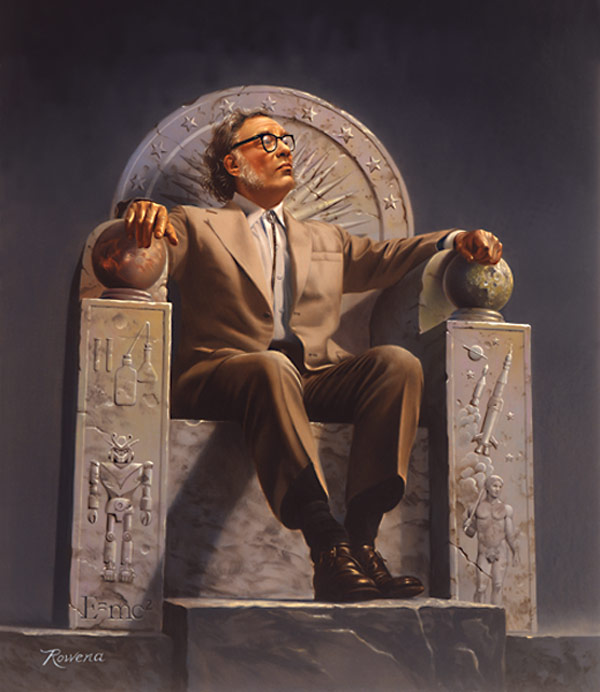 Illustration: Rowena Morrill. (GFDL)
Illustration: Rowena Morrill. (GFDL)
“What I will be remembered for are the ‘Foundation’ Trilogy and the Three Laws of Robotics. What I want to be remembered for is no one book, or no dozen books. Any single thing I have written can be paralleled or even surpassed by something someone else has done. However, my total corpus for quantity, quality and variety can be duplicated by no one else. That is what I want to be remembered for.” – 20 September 1973; included in Yours, Isaac Asimov, 1995.
Isaac Asimov was born on 2 January 1920 and died on 6 April 1992. The asteroid 5020 Asimov is also named in his honour.
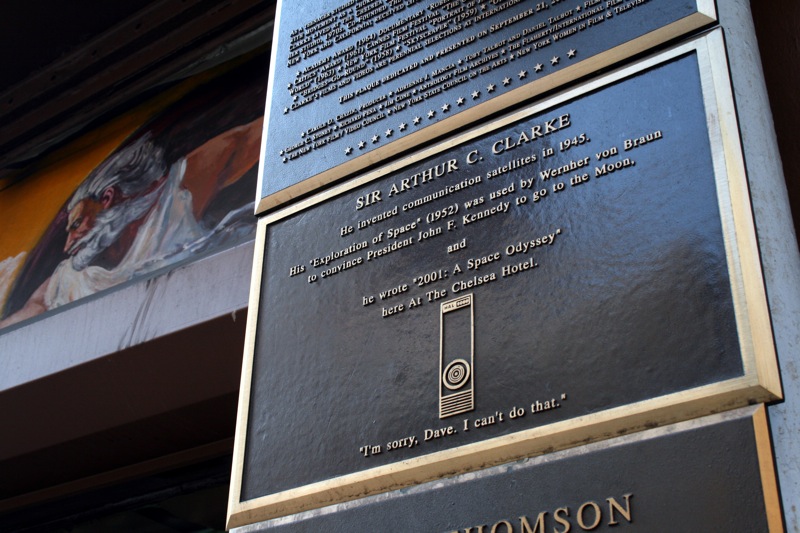 Photo: Pete Young, 2007 (CC by-nc-sa 3.0).
Photo: Pete Young, 2007 (CC by-nc-sa 3.0).
The distinctively bohemian Chelsea Hotel, at 222 West 23rd Street, New York, was opened in 1884 as one of the city’s earliest cooperative apartment houses. It became a hotel around 1905 and is now on the US National Register of Historic Places. Artists and writers who have lived here over the years include Brendan Behan, William Burroughs, Arthur B. Davies, James T. Farrell, Robert J. Flaherty, O. Henry, Arthur Miller, James Schuyler, John Sloan, Dylan Thomas, Virgil Thomson, Thomas Wolfe... and Arthur C. Clarke, who first stayed here in 1956, and again in 1964 while writing 2001: A Space Odyssey.
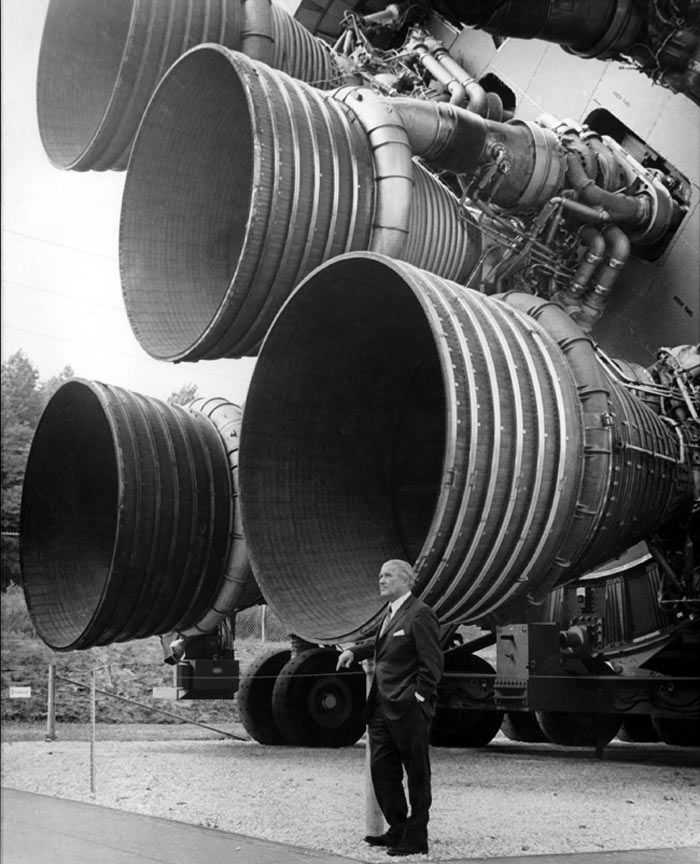 Photo: NASA. (public domain)
Photo: NASA. (public domain)
Born on 23 March 1912 in Wyrzysk in the German Kingdom of Prussia (now Poland), Wernher von Braun has become known as ‘the father of modern space flight’, and is pictured here standing by the five F-1 engines of a Saturn V launch vehicle. His modest contribution to science fiction was his novel Project Mars: a Technical Tale, set in 1980, and which, according to his biographer Erik Bergaust, was rejected by no less than eighteen publishers. He later published portions of this work in magazines to illustrate and popularize Project Mars, and only in 2006 was the complete manuscript published as a book. The novel was also used as the basis for Byron Haskin’s film Conquest of Space in 1955, though von Braun was not credited.
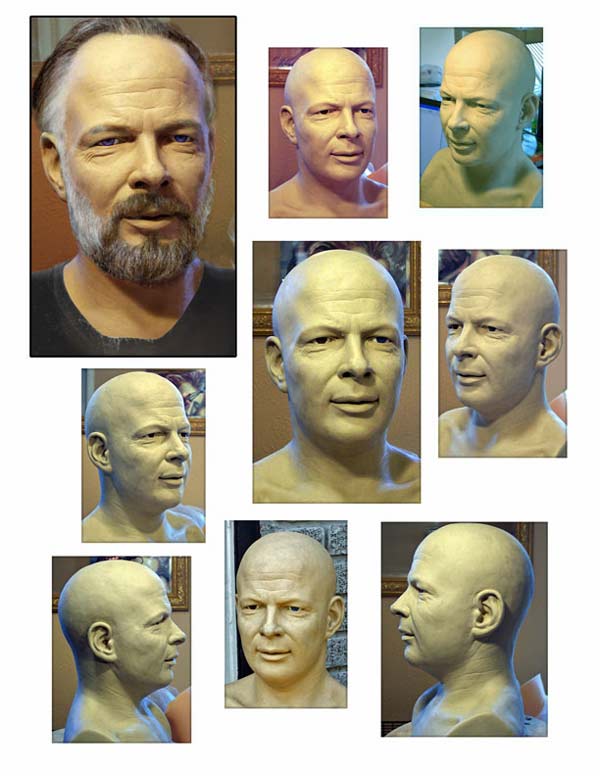 Photos: publicity shots, © 2005 Hanson Robotics, all rights reserved.
Photos: publicity shots, © 2005 Hanson Robotics, all rights reserved.
The PKD-A Android, also known as ‘RoboPhil’ and built by Hanson Robotics, converges numerous machine perception and AI technologies to mimic Philip K. Dick’s conversation style and facial movements. RoboPhil also had his own living environment known as ‘Club VALIS’, and has since attended several conventions, including Comic-Con in July 2005 at which he appeared as a panelist. ‘RoboPhil’ went missing in January 2006: he was packed for a flight to California, was last seen being loaded onto the plane, and has still not been recovered.
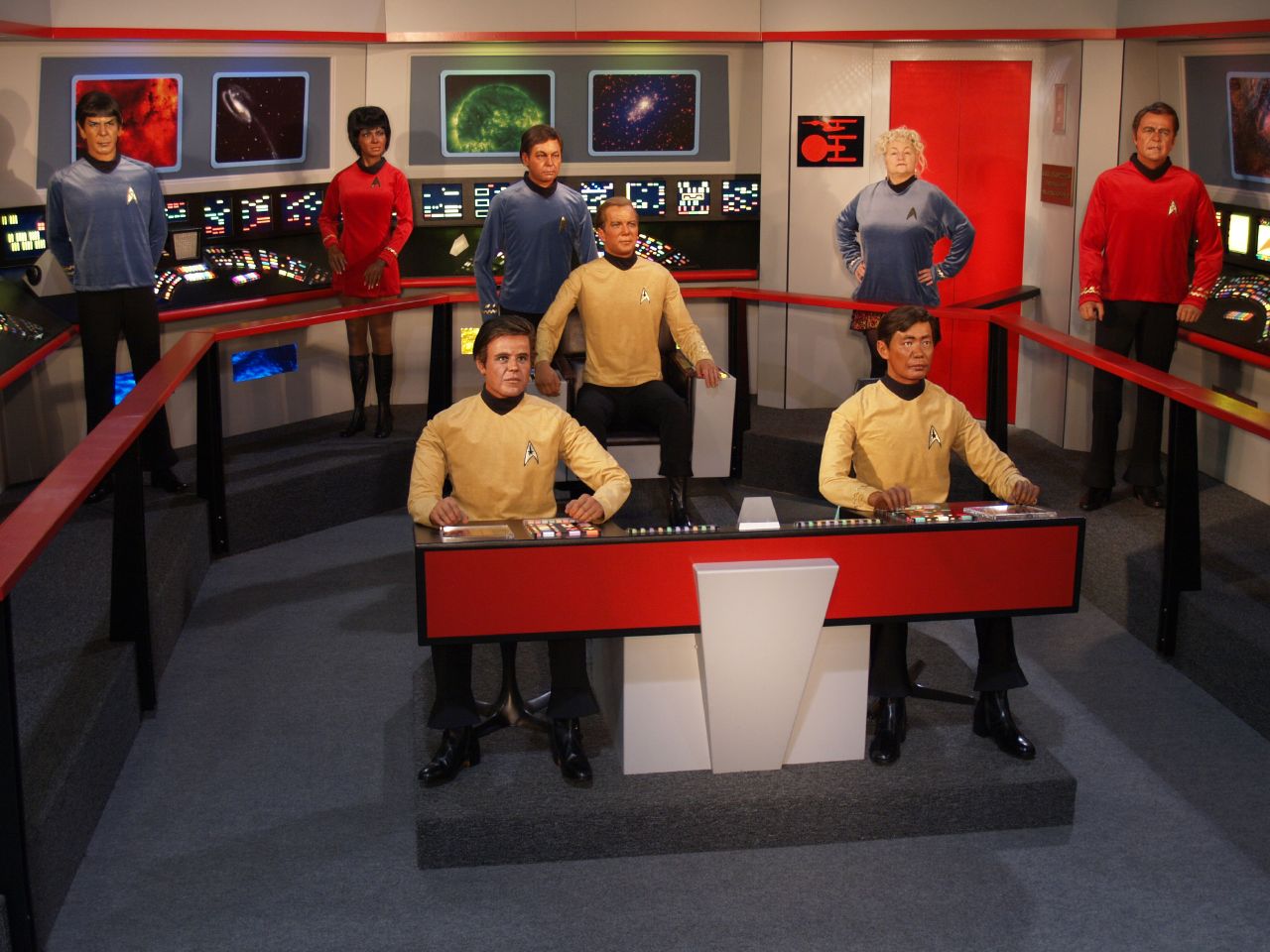 Photo: Pat Cadigan, 2006. (CC by-nc-sa 2.0)
Photo: Pat Cadigan, 2006. (CC by-nc-sa 2.0)
A very rare still from the lost (and sadly never-seen) episode from the original series of Star Trek: ‘The Blonde On The Edge of Forever’.
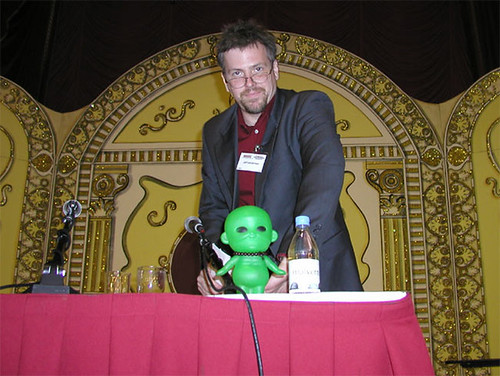 Photo: © 2004 Cheryl Morgan, used by permission.
Photo: © 2004 Cheryl Morgan, used by permission.
Jeff VanderMeer and Alien Baby at Concourse, the 55th British National Science Fiction Convention (Eastercon) at Blackpool, Lancashire, April 2004.
 Photo: © 1978 Lois Siegel, used by permission; text adapted from Wikipedia.
Photo: © 1978 Lois Siegel, used by permission; text adapted from Wikipedia. Photo: © 2007
Photo: © 2007  Photo: AlfredTNT, 2006. (
Photo: AlfredTNT, 2006. (

 Photo: Pete Young, 2007 (
Photo: Pete Young, 2007 ( Photo:
Photo:  Photos: publicity shots, © 2005
Photos: publicity shots, © 2005  Photo:
Photo:  Photo: © 2004
Photo: © 2004 
